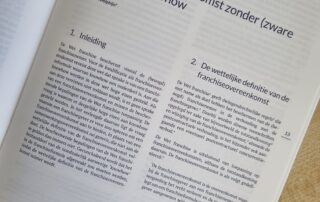The organizational structure of a franchisor
Earlier installments of this section have already discussed the consequences of a bankruptcy of the franchisor for the franchisees. They are of many kinds. Consideration was given to problems that may arise when the supplier of goods and services is a different entity than the contracting party with whom the franchise agreement has been concluded. Such a construction blocks the settlement of a claim from the franchisor’s side on account of, for example, unpaid goods and services against a claim of the franchisee against the franchisor on account of, for example, failed forecasts or other damage. Identification of both legal entities is an exception.
However, this theme touches on a much broader issue that is indirectly also addressed in the European Code of Honor on Franchising, namely the principle that a franchisor “is who he says he is”. In general, it is highly recommended, and good franchisor practice, to ensure that the entity with whom the franchisee enters into the franchise agreement is actually the accountable party for all matters related to the franchise relationship. It follows from the nature of the franchise agreement, and the related duty of care of a franchisor, that a franchisee must be able to address his franchisor at any time without hesitation, without first considering whether the matter he wishes to discuss is now has to do with delivered goods, forecasts, exclusive territory or whatever. Naturally, a franchisor can use contract suppliers. In that case, however, it must be made clear that the supplier concerned is a third party that independently concludes a supply agreement with the franchisees involved.
If work is done in accordance with the above, the franchisee knows at all times exactly who he is dealing with and where he stands. In principle, this also prevents a franchisor from being too tempted to use “empty” BVs, which, should a franchisee claim liability, ultimately offer no recourse. Such a state of affairs does not do justice to the nature of franchising as a form of cooperation. Incidentally, this reasoning also applies vice versa for the franchisee: he too should not hide behind legal personal constructions that stand in the way of both accountability and liability.
Ludwig & Van Dam franchise attorneys, franchise legal advice

Other messages
Continued activities of the franchisee do not violate a non-competition clause
A judgment was recently rendered in preliminary relief proceedings in ...
Car dealer wrongly not a franchisee?
The Franchise Act entered into force on 1 January ...
Suspension of payouts allowed by the franchisor
The District Court of Limburg ruled on 30 March 2023, ...
Franchising is on the rise: ‘There is still a huge amount of room for it in the Netherlands’
An interview with mr. AW Dolphijn about franchise. De Beren, ...
The franchise agreement without (heavy demands on) know-how
In the 2023-1 edition of Contracting magazine, I published a ...
Standstill period violation
On 15 March 2023, the District Court of Noord-Holland, ECLI:NL:RBNHO:2023:2636, ...







